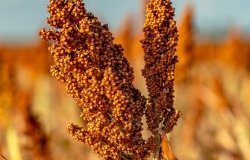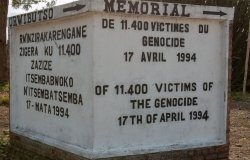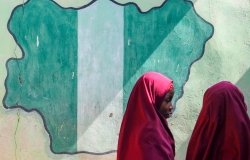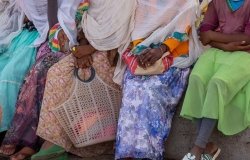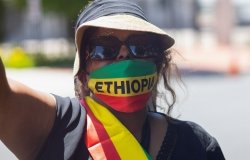
A blog of the Africa Program
Daily News on Issues Affecting Africa for July 23rd

Continue reading for a summary of recent news stories relating to some of the most pressing issues on the continent. We draw on a wide range of respected news sources, both from Africa itself and around the world. The themes of today's In the News post are: updates on peace talks in the CAR, insecurity in Kenya, Niger's birth rates, and if Africa is rich enough the attract McDonalds.
Central African Republic Rebels Want Country Partitioned
Armed militias are expected to sign a deal ending hostilities before eventual negotiations on a comprehensive agreement. After three days of frantic negotiations that began on July 21, 2014, international representatives and 170 Central African Republic, CAR, stakeholders are due to end discussions today, July 23, 2014, in the Congolese capital, Brazzaville. The talks are aimed at ending the ongoing sectarian violence in the country and preventing further civil conflicts that have plagued the country for most of its post-independence history.
To Read More from AllAfrica Click Here
Mombasa leaders protest failure to end insecurity
Business, religious and civil society leaders as well as ordinary people in Mombasa say they are tired of insecurity. Tuesday, they condemned escalating violence and general insecurity and told the national and county governments to restore normalcy. The groups spoke in the wake of the killing of five people — two on Monday night and three on Sunday — by hooded men. The Monday night killings happened in the town's central business district of Kenyatta Avenue and the Sunday one in Soweto, Likoni.
To Read More from the Daily Nation Click Here
Niger Is Hurt by Runaway Birthrates
DAKAR, Senegal — Nearly every year, the West African desert nation of Niger faces a food crisis, and nearly every year the international aid agencies, including the United Nations, send out urgent appeals for funds to feed the country's starving millions. This year is no different. Niger, where women pick bitter green berries off scrubby trees to stave off starvation, cannot feed itself. That unchanging reality is buttressed by another one, equally stubborn and deeply frustrating to demographers. With an average of nearly eight children per woman, Niger, by some measures the poorest country in the world, also has its highest birthrate. At current rates, the population will double in the next 15 years, to 35 million from over 17 million.
To Read More from the New York Times Click Here
Nigeria bomb attack in Kaduna 'leaves 25 dead'
A bomb blast in the northern Nigerian city of Kaduna has killed at least 25 people, police say. The bomb targeted moderate Islamic cleric Dahiru Bauchi who escaped unhurt, police added. Soon after the explosion, another blast could be heard in Kaduna, but details remain sketchy, a BBC reporter says. Militant Islamist group Boko Haram has carried out a wave of bombings and assassinations in Nigeria since it launched a brutal insurgency in 2009.
To Read More from BBC Africa Click Here
Is Africa rich enough for McDonald's?
Three quarters of a century since the opening of the first McDonald's, the fast food chain operates around 34,000 outfits in around 120 countries and territories across all continents. In sub-Saharan Africa, however, – a region of 48 countries and almost a billion people – only South Africa and Mauritius have been able to attract this global food chain.
To Read More from How We Made it in Africa Click Here
Related Program

Africa Program
The Africa Program works to address the most critical issues facing Africa and US-Africa relations, build mutually beneficial US-Africa relations, and enhance knowledge and understanding about Africa in the United States. The Program achieves its mission through in-depth research and analyses, public discussion, working groups, and briefings that bring together policymakers, practitioners, and subject matter experts to analyze and offer practical options for tackling key challenges in Africa and in US-Africa relations. Read more



